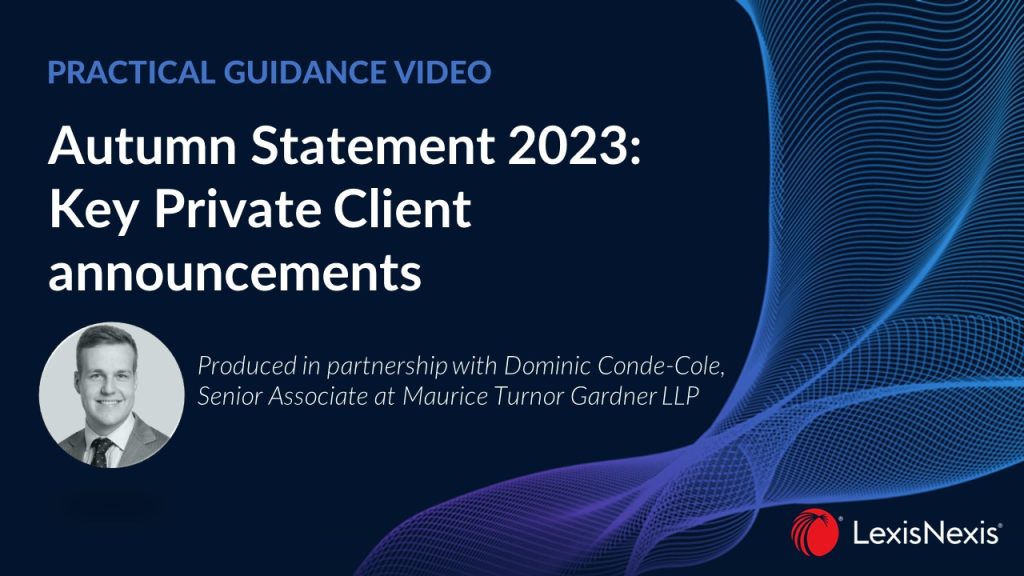
7 March 2024
The UK Spring Statement: the impact for international clients
Ed Powles and Dominic Condé-Cole
This has generated a flurry of debate and discussion. The possibility of abolishing “domicile” as a tax test is not completely new, and many suggestions have been made over the years as to how the regime could be changed. What is interesting is that the Government has not just focused on the “remittance” basis – as discussed below. It has also set out proposals relating to inheritance tax, and to trusts.
Some of these are genuinely positive, in our view, and should lead to a simpler, economically more rational, regime. But “the devil is in the detail” and there are a number of areas where we think that the proposals should be amended to better implement the Government’s policy goals as we understand them. This is particularly the case in relation to inheritance tax, and to the taxation of trusts settled by people who are resident in the UK. We are looking at the detail of the proposals carefully.
There will be a wide-ranging impact for many clients, including people who are considering moving to the UK; people who are leaving the UK; and people who are currently resident here.
The below is a high-level summary of some of the key points to note, including the wider non-tax application of domicile (which it is sometimes easy to overlook).
In considering the below, it is important to note that any changes are due to be implemented with effect from 6 April 2025. There is therefore time to reflect on the detail with care. And it must not be forgotten that it is quite possible for there to be a change of Government before the intended implementation date. Planning should therefore proceed with some caution.
INCOME AND CAPITAL GAINS TAX
The end of the remittance basis regime
It was announced that the existing remittance basis regime which is based on the concept of domicile will be entirely replaced from 6 April 2025.
Key points include:
- The last year for which a remittance basis claim can be made will be the 2024-25 tax year.
- From 6 April 2025, individuals who have not been resident in the UK for the preceding 10 years, can elect into a new residence based regime under which they do not pay UK income and capital gains tax on their foreign income and capital gains (FIGs) for four years. This is irrespective of whether the FIGs are remitted.
- Thereafter, all will be liable to UK income and capital gains on their worldwide assets in the same way as UK resident and domiciled individuals, in the sense that term is currently understood.
- There is currently no indication that there will be a cost (akin to the remittance basis charge, or any sort of flat tax) to access the new regime.
Transitional relief
Transitional provisions will apply to individuals who are ineligible for the new regime but who currently benefit from the remittance basis. These are:
- 50% relief on tax on foreign income during 2025/26 only.
- Non-UK assets held at 5 April 2019 may be rebased to their market value on that date.
Moreover, there will be a new “temporary repatriation facility” for RNDs who have previously been taxed on the remittance basis.
- For the two year window from 6 April 2025 to 5 April 2027, FIGs that arose before 6 April 2025 may be remitted to the UK and taxed at a reduced rate of 12%.
- This is intended as an incentive for individuals to bring funds into the UK without the complexities associated with the current regime which is, for many, an effective deterrent from bringing funds into the UK. It is anticipated that there may be some relaxation of the existing mixed funds rules to facilitate this.
- This “temporary repatriation facility” does not apply to income and gains generated in foreign trusts.
Trusts
There will be an end to the current regime which prevents FIGs from being taxed on UK resident settlors who retain an interest in a trust (the so-called “protected trust” rules). From 6 April 2025:
- FIGs arising in a trust (whenever established) will be taxed on the settlor unless that settlor qualifies for the new regime.
- Beneficiaries and settlors who are eligible for the new regime will be able to receive benefits in the UK free from any immediate UK tax charges.
- Where benefits are taxable, pre 6 April 2025 foreign income and gains will remain available for matching but without the benefit of the remittance basis.
INHERITANCE TAX (“IHT”)
The government will consult on changing liability to IHT to a residence based system, from the current domicile based system. Changes will not take effect before 6 April 2025. The government’s current proposals (which will be subject to consultation) are set out below.
Personally held property
- IHT will be charged on worldwide assets owned outright when a person has been resident in the UK for 10 years, with a provision to keep a person in scope for 10 years after leaving the UK.
- UK situs assets will remain in scope on the same basis as at present, regardless of residence.
Trust Property
- Existing trusts and trusts settled before 6 April 2025 will be subject to IHT in the same manner as they are currently. This is important, as it means that trusts that currently shelter IHT will continue to do so.
- For property settled on or after 6 April 2025:
- IHT on assets comprised in a settlement will depend upon the settlor’s residence status (the 10 year period of residence or 10 years post residence) at the time the assets are settled and/or the occurrence of a taxable event. This could imply that the status of the trust might change with the residence status of the settlor rather than being fixed at the time the trust was settled.
- UK situs assets will remain in scope on the same basis as at present, regardless of residence.
THE WIDER APPLICATION OF DOMICILE
Whilst this would spell the death of domicile for the purposes of direct tax in the future, it is essential to remember that domicile will remain relevant for other non-tax purposes. That includes deciding which law determines the succession to a person’s estate, and whether claims may lie against the estate, and jurisdiction to bring certain claims in the UK courts.
If you would like further information please get in touch with your usual contact at MTG, or email info@mtgllp.com.
This note does not contain or constitute legal advice, and no reliance should be placed on it.
Ed Powles
Partner
“Recognised by everyone as a brilliant lawyer”, Ed Powles advises on a range of private client and commercial trusts work.
Dominic Condé-Cole
Senior Associate
Dominic has extensive experience in advising national and international high net worth and ultra high net worth individuals, businesses and listed companies on UK taxation and wealth planning.






